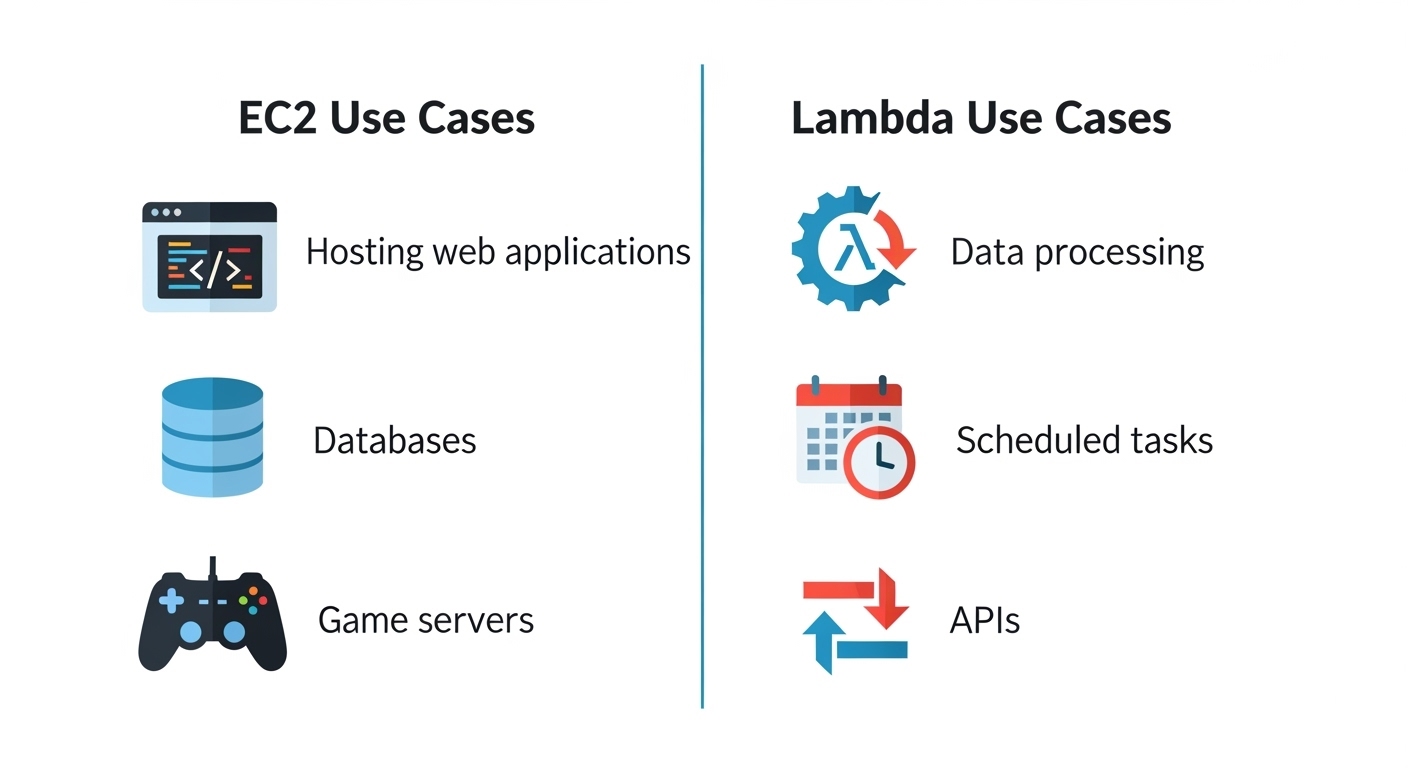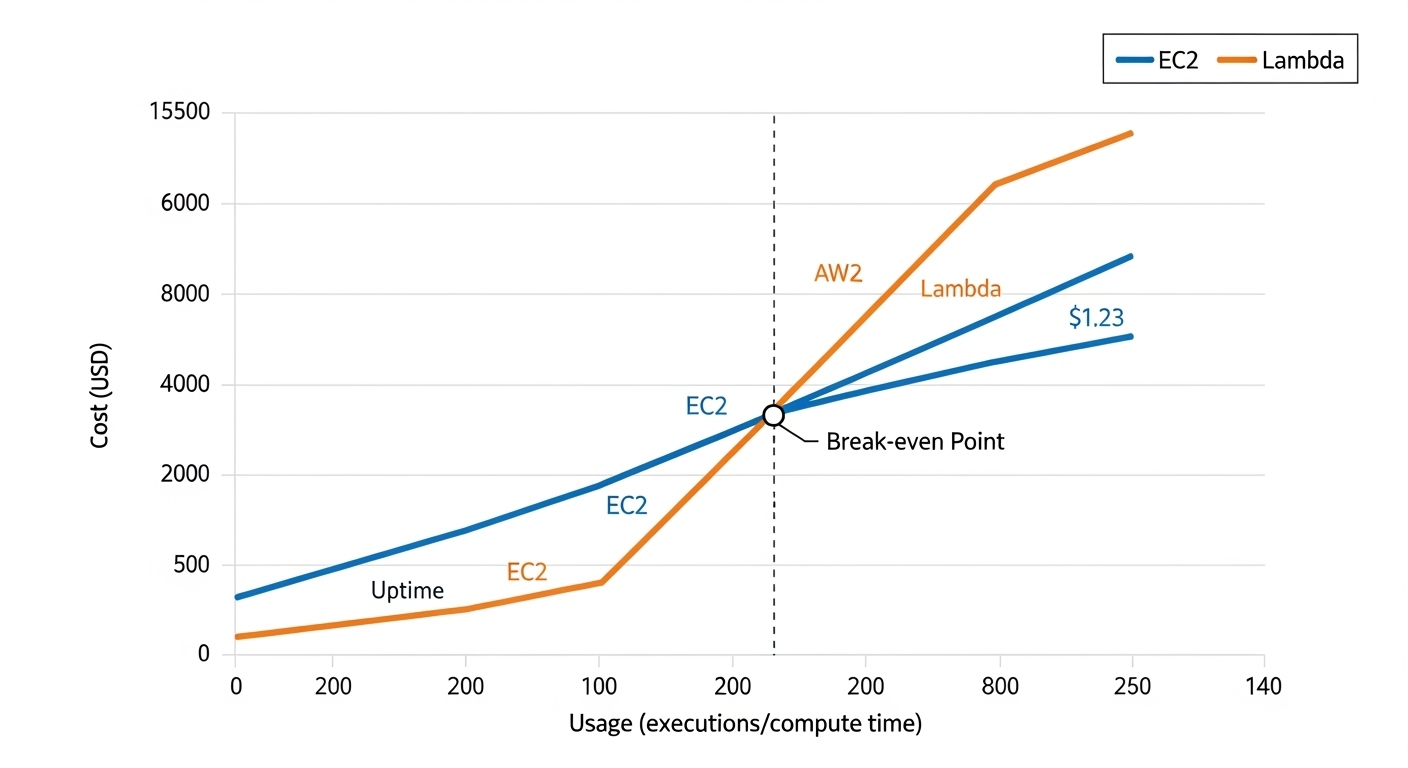AWS EC2 vs Lambda: Which One Should You Actually Use?

Amazon Web Services has dozens of compute options, but the two that come up over and over are EC2 and Lambda. Both let you run code in the cloud. Both scale well. Both are rock solid. But the way they work is so different that choosing the wrong one can lead to wasted time and money.
Think of it like this: EC2 is renting a computer in the cloud. Lambda is renting tiny slices of computer time only when you need them. That single distinction changes everything about cost, performance, and how you design your apps.
What is AWS EC2 and how does it work?
EC2 (Elastic Compute Cloud) is the service AWS has been pushing since 2006. At its core, it’s a virtual machine in the cloud. You pick an instance type (tiny, medium, massive), an operating system (Linux, Windows, whatever you like), and you’re off.
You’re responsible for almost everything—installing software, handling security patches, scaling up or down when traffic changes. EC2 gives you control and flexibility, but with that comes responsibility.
Quick example: Spin up an EC2 instance, SSH into it, install Node.js, and run:
node server.jsBoom. Your server is live. You’ve basically replicated what you’d do on your laptop, just in AWS’s data center.
What is AWS Lambda and how does it work?
AWS Lambda is the opposite philosophy. No servers, no patching, no choosing instance sizes. You just upload your code, set up a trigger (like an HTTP request, S3 file upload, or DynamoDB stream), and AWS runs it for you.
You pay only for the milliseconds your code runs. That’s why Lambda is called serverless—servers still exist, but you don’t manage them.
Quick example: Deploy a simple Lambda function:
exports.handler = async (event) => { return { statusCode: 200, body: JSON.stringify({ message: "Hello from Lambda!" }) };};That’s it. No provisioning, no VM setup.
Key differences between AWS EC2 and AWS Lambda
If you like fine-grained control, choosing CPU, memory, disk size, network, you’ll feel at home with EC2. You can run Docker, full databases, legacy apps, or any software stack you want.
If you care more about convenience, just write code and let AWS deal with the rest, Lambda wins. It’s built for microservices, APIs, event-driven systems, and workloads that don’t run 24/7.
AWS EC2 use cases with examples
When EC2 makes sense:
-
Hosting a full web application that needs consistent uptime and performance.
-
Running a database like PostgreSQL or MongoDB.
-
Deploying machine learning models that need GPUs.
-
Migrating legacy apps that expect to live on a traditional server.
AWS Lambda use cases with examples
-
APIs that get spiky traffic (burst of users, then silence).
-
Processing files uploaded to S3 (images, logs, data pipelines).
-
Scheduled jobs like cron tasks.
-
Glue code that connects AWS services together.

AWS EC2 vs Lambda pricing explained
This is where most people get burned.
EC2 pricing: You pay per hour (or second, depending on instance type), whether the server is busy or idle. If your site gets 10 visitors in a day, you’re still paying for 24 hours of uptime.
Lambda pricing: You pay per request and per millisecond of execution time. If your function doesn’t run, you pay nothing.
Example:
-
EC2 t3.micro: about $8 a month, always on.
-
Lambda's free tier includes 1M requests and 400,000 GB-seconds per month. Beyond that, a function that runs 1 second a million times might cost around $16.
So, if you’ve got steady traffic, EC2 can be cheaper. If you’ve got unpredictable or low traffic, Lambda almost always wins.
Performance comparison: EC2 vs Lambda
Latency: EC2 is always on, so responses are instant. Lambda sometimes suffers from “cold starts,” especially if your function hasn’t run in a while. Cold starts add a few hundred milliseconds. For APIs where speed is critical, that matters.
Scaling: With EC2, you need auto-scaling groups, load balancers, and some planning. With Lambda, scaling is automatic, if 10,000 people hit your API at once, AWS spins up 10,000 function instances behind the scenes.
Limits: Lambda has execution limits (max 15 minutes per function, limited memory and CPU). If you’re running long tasks like video encoding, EC2 is your friend.

Limitations of AWS EC2 and Lambda
Statefulness: EC2 lets you keep state in memory or on disk. Lambda is stateless by design. If you need to store data between requests, you’ll need an external service like DynamoDB or Redis.
Networking: EC2 gives you full VPC control. Lambda can connect to VPCs too, but cold starts get slower when you do.
Tooling: Debugging on EC2 feels familiar (SSH in, check logs). Debugging Lambda sometimes feels alien, especially with distributed logs across CloudWatch.
Can you use EC2 and Lambda together?
Here’s the truth: many serious applications use both, usually tied together by a CI/CD pipeline that automatically deploys code to EC2 and Lambda as part of the same workflow.
For example:
-
Use EC2 to run your core app and database.
-
Use Lambda for background jobs, file processing, or API endpoints that spike.
This hybrid model lets you balance cost and flexibility. AWS doesn’t care, you’re paying them either way.
Code examples: Running a simple server on EC2 vs Lambda
EC2 Node.js Server (Express):
const express = require('express');const app = express();
app.get('/', (req, res) => { res.send('Hello from EC2');});
app.listen(3000, () => console.log('Server running on port 3000'));Deployed on EC2, this runs 24/7.
Lambda Equivalent (with API Gateway):
exports.handler = async (event) => { return { statusCode: 200, body: 'Hello from Lambda' };};This runs only when someone makes a request through API Gateway.
AWS EC2 vs Lambda: Which one should you choose?
If you’re building something small, unpredictable, or event-driven, Lambda is your best bet.
If you need full control, long-running processes, or consistent high traffic, EC2 is safer.
And if your app is complex, you’ll probably end up mixing both.
Conclusion
The EC2 vs Lambda debate isn’t about which is “better.” It’s about context. EC2 is a flexible workhorse that never stops. Lambda is an elegant solution for bursts of activity without overhead.
Pick the one that matches your workload, your budget, and your patience for ops work. And remember, nothing stops you from starting with Lambda for speed, then adding EC2 when you outgrow it.
Windframe is an AI visual editor for rapidly building stunning web UIs & websites
Start building stunning web UIs & websites!
